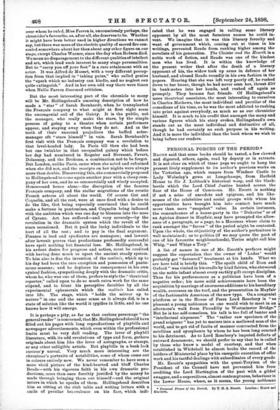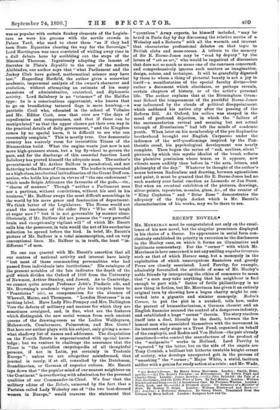PERSONAL FORCES OF THE PERIOD.* BACON said that some books
should be tasted, a few chewed and digested, others, again, read by deputy or in extracts. It is not clear on which of these pegs we ought to bang the present lively supplement to its author's previous works on the Victorian age, which ranges from Windsor Castle to Lady Wolseley's gown at Longchamps, from Hatfield House to Sir J. Lubbock's historical wasp, and the black- beetle which the Lord Chief Justice hunted across the floor of the House of Commons. Mr. Escott is nothing if not a mine of anecdote and epigram, and his like- nesses of the celebrities and social groups with whom his opportunities have brought him into contact have much more than mere "snapshot" value. In certain instances, the remembrance of a house-party in the " Dukeries " or of an Apician dinner in Mayfair, may have prompted the allow- ance of a paragraph, or a page, to a Mmcenas whose claim to rank amongst the "forces ' of the period might be contested. Upon the whole, the objectivity of the author's portraiture is well maintained ; as to politics (if we may quote the poet of one of his favourite neighbourhoods), Tories might call him Whig, "and Whigs a Tory."
A list of names in one of Mr. Escott's prefaces might suggest the expectation that the owner of Ladas ' would probably get "favoured" treatment at his hands. What we are here told is briefly this. "The spoilt child of Eton and Oxford" was visited in his cradle by kind fairies, who showered on the noble infant almost every earthly gift except discipline. Thus far his performances as a politician have been of a negative order ; his more solid achievements have been the acquisition by marriage of enormous additions to his hereditary wealth, successes on the turf, and the presentation in Mayfair of the fashionable American of the new type. On a congenial - platform or in the House of Peers Lord Rosebery is "as - pleasant a young nobleman as one would wish to meet in an i afternoon's walk from Piccadilly to Westminster Bridge." But he is too self-conscious, his talk is too full of banter and = "intellectual sixpences." The "rather raw specimen of the grand seigneur " has yet to mature into a mellowed man of the
world, and to get rid of faults of manner contracted from the E satellites and sycophants by whom he has been long courted ;
to his detriment. As to Lord Rosebery's imputed defects of i outward demeanour, we should prefer to say that he is called ; by those who know a model of courtesy, and that when ; established in Whitehall he almost broke the record of the holders of Ministerial place by his energetic execution of office work and his tactful dealings with subordinates of every grade.
Mr. Escott's sympathies with the quasi-Toryism of the President of the Council have not prevented him from crediting the Lord Hartington of the past with a gilded swagger, and a supercilious, almost contemptuous, behaviour in the Lower House, where, as it seems, the young nobleman
• Personal Forces of the Period. By T. H. S. Escott. London : Hunt and Blazkett.
was as popular with certain flunkey elements of the Legisla- ture as were his grooms with the servile crowds in Palace Yard, who used to cheer them "as if they had been State Equerries clearing the way for the Sovereign." Lord Hartington was once convicted of whiling away time in a dull debate hour by scribbling out the steps of the Binomial Theorem. Ingeniously adapting the lament of Socrates in Plato's Republic to the case of the modern Alcibiades, our author says that "what Parliament and the Jockey Club have gained, mathematical science may have lost." Regarding Hatfield, the author gives a somewhat academic, impersonal analysis of the owner's character and evolution, without attempting an estimate of his many mansions of administrative, oratorical, and diplomatic activity. Lord Salisbury is no "trimmer" of the Halifax type : he is a conscientious opportunist, who knows that to go on brandishing tattered flags is mere humbug,—a patriotic Cecil who, educated in the school of Voltaire and Mr. Editor Cook, sees that ours are "the days of expediencies and compromises, and that if these can be manipulated" so that the upper classes get their own way in the practical details of daily government, "and the Kingdom comes by no special harm, it is difficult to see who can reasonably complain." This is mostly true. Our democratic country has scarcely room for irresistible Titans of the Bismarckian build. What the engine wants just now is not more high-pressure steam, but a big fly-wheel to govern the pace, and for the discharge of this essential function Lord Salisbury has proved himself the adequate man. The author's presentment of Mr. Arthur Balfour is paradoxical, and not flattering to the House of Commons. The leader is represented as a high-class, intellectual latitudinarian of the Grant Duff con- nexion, who holds his place in virtue of "the one endowment" which made Scipio Africanus the favourite of the gods,—viz., "charm of manner." Though "neither a Parliament man nor a partisan, without convictions, without his soul in his business," Mr. Balfour sways the most difficult assemblage in the world by his mere grace and fascination of deportment. We think better of the Legislature. The House would not stand the insolence of the elder Pitt's "Who will laugh at sugar now ? " but it is not governable by manner alone. Obviously, if Mr. Balfour did not possess the 'every powerful brain and exceptionally vigilant will" of which Mr. Escott calls him the possessor, in vain would the net of his saccharine seduction be spread before the bird. In brief, Mr. Escott's picture of Mr. Balfour is a total misconception, and on very conventional lines. Mr. Balfour is, in truth, the least " in- different " of men.
No one can quarrel with Mr. Escott's assertion that all our centres of national activity and interest have lately "lost most of those commanding personalities who had passed from individuals into institutions." His catalogue of the present notables of the Isis indicates the depth of the gulf which divides the Oxford of 1898 from the University of Newman, Arthur Stanley, and Jowett. As to Cambridge, we cannot quite accept Professor Jebb's Pindaric ode, and Mr. Browning's academic vigour plus his tricycle tours to "Pontricina" (sic), as compensation for the absence of Whewell, Maine, and Thompson. "London Hostesses" is an inviting label. Have Lady Fitz-Pompey and Mrs. Dallington Vere the defects of millinery and manner for which they are sometimes arraigned, and, in fine, what are the features which distinguish the new social woman from such ancient queens of the drawing-room as the Ladies Waldegrave, Molesworth, Combermere, Palmerston, and Mrs. Grote ? But here our author plays with his subject, only giving a some- what shadowy list of names and addresses. The disquisition on the Fourth Estate is supersaturated with special know- ledge ; but we venture to challenge the assurance that the Times is "the quotidian encyclopmdia of all thoughtful persons, if not in Latin, yet certainly in Teutonic Europe " : unless we are altogether misinformed, that journal is rarely, if at all, consulted by the Dutchman, Scandinavian, or German of superior culture. Mr. Eacott lays down that " the popular mind of our nearest neighbour on the Continent" is overflowing with admiration for the personal qualities of our Commander-in-Chief. We fear that the military editor of the Debats, unmoved by the fact that a Parisian called Lady Wolseley one of "the two best-dressed women in Europe," would traverse the statement that " countless " Army experts, he himself included, "may be heard in Paris day by day discussing the relative merits of a. Wolseley and a Roberts" with all the warmth and interest that characterise professional debates on that topic in British clubs and mess-rooms. A tribute to the memory of Sir E. Burne-Jones may be "read by deputy" by the lovers of "art as art," who would be impatient of discussion that does not so much as name one of the canvases concerned, and comprehensively ignores such matters as imagination,. design, colour, and technique. It will be gratefully digested' by those to whom a thing of pictorial beauty is not a joy in itself—a manifestation of the special faculty divine--but rather a document which elucidates, or perhaps reveals,. certain chapters of history, or of the artist's persona) life. The author explains that at the Birmingham Gram- mar School the temperament of the youthful Borne-Jones" was influenced by the clouds of political disappointment which saddened his native city after the passing of the Reform Bill. At Oxford, his milieu was steeped in the mood of profound dejection, in which the "failure of the sacramentarian revival and seeming but not actual. triumph of Erastianism " bad left the minds of academic' youth. When later on his membership of the pre-Raphaelite brotherhood brought our English Carpa,ccio under the influence of the self-questionings inspired by the Pan- theistic creed, his psychological development was nearly complete. Then began the series of "sad, soulless, silent" pictures by which this mystic idealist of the brush reflects the plaintive pessimism whose tones, as it appears, now vibrate more audibly than before in "the arts, letters, and philosophy of the day." Whatever be thought of the author's. nexus between Radicalism and drawing, between agnosticism. and paint, it must be granted that Sir E. Burne-Jones had no- such mastery over facial emotion as Lionardo or Jan Steen. But when an eventual exhibition of the pictures, drawings,. silver-points, tapestries, mosaics, glass, &c., of the creator of " King Cophetua " and "Briar Rose" demonstrates the adequacy of the triple docket which is Mr. Escott'a- characterisation of his works, may we be there to Bee.







































 Previous page
Previous page